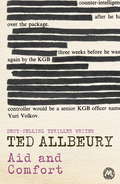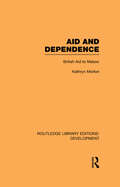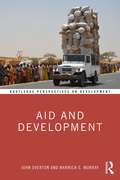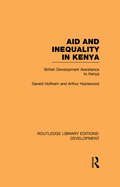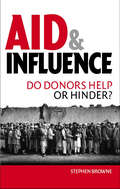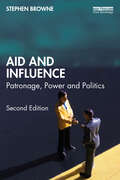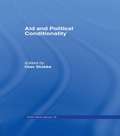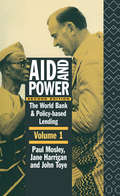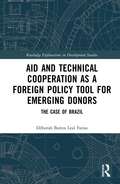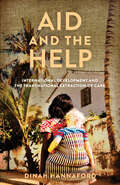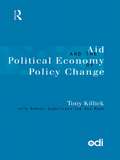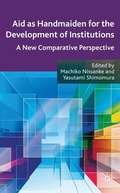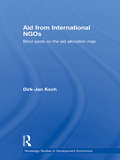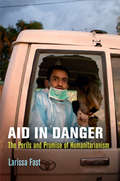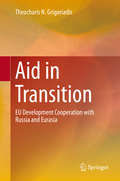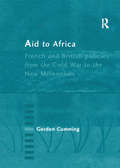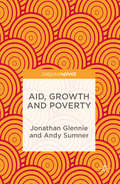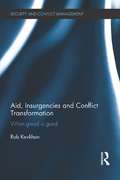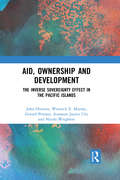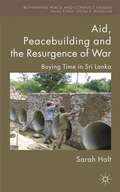- Table View
- List View
Aid and Comfort
by Ted AllbeuryOne spring day in 1985 Arthur Casey marches into the Soviet embassy in Washington offering his services as an informant. He's the most valuable asset the KGB will ever have. Yuri Volkov is the KGB officer appointed as Jarvis's 'controller'. He comes to despise the weak and feckless American prepared to send men to their deaths for financial gain. Larry Getz is the senior CIA officer who must hunt down the traitor in their midst. So begins a cat-and-mouse game of danger and deception, bluff and double-bluff in which, if Getz is to succeed, he'll have to bend the rules and violate the sanctity of the US Constitution. But does the end justify the means? And Just how dirty is Getz prepared to play?
Aid and Dependence: British Aid to Malawi (Routledge Library Editions: Development)
by Kathryn MortonFirst published in 1975, in conjunction with the Overseas Development Institute, this study examines the case for and against aid for developing nations, taking the specific example of British aid to Malawi’s economic development since independence in 1964. Kathryn Morton suggests that without Britain’s aid, Malawi’s capacity to develop would have been severely undermined and that aid has not generally inhibited Malawi’s efforts to help itself. The rapid growth of both agricultural and industrial output alongside foreign exchange earnings and avoidance of large-scale urban unemployment and balance of payment problems do not bear out the critics' gloomy predictions. This book does much to counter the critics’ case against aid and raises a number of vital questions in determining the future shape of aid policies for both Britain and other developed countries.
Aid and Development: The Inverse Sovereignty Effect In The Pacific Islands (Routledge Perspectives on Development)
by Warwick E. Murray John OvertonThis book provides an overview of what aid is, how it has changed over time and how it is practiced, as well as debates about whether aid works, for whom and what its future might be. The text shows how ‘aid’ is a contested and fluid concept that involves a wide and changing variety of policies, actors and impacts. It equips the reader with an understanding of what aid is, where it comes from and where it goes, how it is delivered and what its impacts are, and whether shortcomings are a result of a fundamental problem with aid, or merely the result of bad practices. It explores the changing political ideologies and conceptions of development that continually reshape how aid is defined, implemented and assessed, and how, despite a global commitment to the Sustainable Development Goals, we are at a point where the very notion of aid is being questioned and its future is uncertain. Each chapter includes case studies, chapter summaries, discussions, weblinks and further reading, to help strengthen the reader’s understanding. Aid and Development provides an important resource for students, development workers and policy makers seeking an understanding of how aid works.
Aid and Fiscal Management
by Timothy Lane Aleš BulìřThis paper focuses on the macroeconomic aspects of fiscal management in aid-receiving countries. Despite the declining share of aid in budgets of donor countries, aid continues to play an important role in many developing countries. The paper first discusses the implications of aid in the economy as a whole and highlights the possibility of Dutch-disease effects of aid. Second, it discusses the implications of aid for short-term fiscal policy management - in particular, how actual or anticipated changes in aid receipts should be reflected in government spending.
Aid and Growth: What Does the Cross-Country Evidence Really Show?
by Raghuram G. Rajan Arvind SubramanianWe examine the effects of aid on growth--in cross-sectional and panel data--after correcting for the bias that aid typically goes to poorer countries, or to countries after poor performance. Even after this correction, we find little robust evidence of a positive (or negative) relationship between aid inflows into a country and its economic growth. We also find no evidence that aid works better in better policy or geographical environments, or that certain forms of aid work better than others. Our findings, which relate to the past, do not imply that aid cannot be beneficial in the future. But they do suggest that for aid to be effective in the future, the aid apparatus will have to be rethought. Our findings raise the question: what aspects of aid offset what ought to be the indisputable growth enhancing effects of resource transfers? Thus, our findings support efforts under way at national and international levels to understand and improve aid effectiveness.
Aid and Inequality in Kenya: British Development Assistance to Kenya (Routledge Library Editions: Development)
by Gerald Holtham Arthur HazelwoodThis reissue, first published in 1976, considers the rapid rate of economic growth in Kenya, combined with its apparent political stability, to determine whether or not this is indeed a case of ‘growth without development’ and, if so, where the responsibility for aid lies in this situation. The book concludes that while Kenyan growth has not been to an ideal pattern, accompanied by an increase in inequality, there is little or no reason to believe that living standards have not improved. It examines the impact of aid on Kenya’s progress at both the microeconomic and macroeconomic level and provides an institutional study of the impact of aid on Kenyan Government policy formation and administration and a discussion of British aid’s political purposes and influence in Kenya. The authors conclude that some of the effects predicted by the critics of aid are visible, but that the net effect on general living standards has been strongly positive, concluding that the problems constitute a case for improving aid procedures, but not against aid itself.
Aid and Influence: Do Donors Help or Hinder?
by Stephen BrowneAid is always a means of influence: political, commercial, military and security-related. Some influence is benign, but much of it is coercive, even 'imperialistic'. Given the nature of aid, its effectiveness should be judged not only in developmental terms, but in terms of international relations. Even donors agree that, on both counts, the returns are meagre. This book, drawing on the author's 30 years of field experience, proposes two kinds of solution: donors should climb down from paternalistic central planning practices and support public goods that are neutral and beneficial ? cancellation of debt, fair trade, responsible economic governance, vaccine production, peace-making and peace-keeping. For their part, developing countries should follow the example of the most successful among them: recognize the true costs of 'free' aid, exercise their prerogative to choose their development partners and start paying their own way.
Aid and Influence: Patronage, Power and Politics
by Stephen BrowneThis book turns the argument about aid effectiveness on its head. Since development assistance is inherently self-interested, a source of soft power, political manipulation and commercial opportunity, its real effectiveness could arguably be judged by the strength of donor influence and not by development impact. Its subjective nature means that its impact on development is often weak, mainly short-term and confined to limited and specific contexts. Aid as influence was prevalent during the Cold War era. The connection is equally strong in this century’s newly bipolar world in which the contest is between western donors led by the United States, and China which is spending hundreds of billions of dollars on infrastructure as a means of influence in the global South. Influence permeates both bilateral and multilateral aid and in parallel with official aid, the rise of global philanthropy has seen it taken up by some of today’s billionaires. The response by donors to the growing havoc caused by the three Cs – conflict, climate change and COVID-19 – confirms the main findings of the book, which concludes by outlining what aid without influence would look like. This book draws on the author's 40 years of experience of the aid industry and will be essential reading for development students, practitioners and policy makers alike.
Aid and Political Conditionality (Routledge Research EADI Studies in Development #No. 16)
by Olav StokkeForeign aid has increasingly become subject to political conditionality. In the 1980s some institutions made aid dependent upon the recipient countries' economic policy reforms. Market liberalisation was the primary instrument and objective. In the 1990s such conditionality was brought one step further; aid was now linked to political reforms, affecting recipient countries' governing systems, requiring democracy, human rights and 'good governance'. This volume looks at these developments and considers the conditionality policies of several European aid donors. Such policies are also considered from recipient perspectives, both from the Third World and Russia, and the issue is also considered from a historical perspective.
Aid and Power - Vol 1: The World Bank and Policy Based Lending
by Jane Harrigan Paul Mosley John ToyeWhen the major aid organizations made flows of aid conditional on changes in policy, they prompted an extensive debate in development circles. Aid and Power has made one of the most significant and influential contributions to that debate. This edition has been revised to take account of changes within the World Bank itself and the extension of policy based lending to the formerly socialist economies of east and central Europe.
Aid and Technical Cooperation as a Foreign Policy Tool for Emerging Donors: The Case of Brazil (Routledge Explorations in Development Studies)
by Déborah Barros FariasThe question of why countries give aid and assistance to other countries has long been a topic of debate- is it altruism, or selfishness? The assumption is sometimes made that donors from developing countries might be more motivated by altruism than ‘traditional’ western donors. This book demonstrates that on the contrary, the provision of development assistance can be used to serve national interests, allowing so-called ‘emerging’ donors to gain soft power in the international sphere by improving their image and global influence. Technical cooperation, or the transfer of knowledge, is an area of particular interest, as it can enable donors to position themselves as a global leader in a given field, with a unique set of skills and expertise in a knowledge area. This book uses the Brazilian case to demonstrate how a country such as Brazil can seek power and influence by providing no-strings-attached technical assistance. The empirical analysis unpicks the motivations behind development assistance, and how it can be used as a foreign policy tool. In doing so, the book sheds light upon the similarities and variations in the provision of technical cooperation as a foreign policy tool by China, India, and Brazil. This book will be of interest to researchers of International Development, South-South Cooperation, International Relations, and those working on Brazil specifically.
Aid and the Dutch Disease in Low-Income Countries: Informed Diagnoses for Prudent Prognoses
by Mwanza NkusuFinancial report from the IMF
Aid and the Help: International Development and the Transnational Extraction of Care (Globalization in Everyday Life)
by Dinah HannafordHiring domestic workers is a routine part of the expat development lifestyle. Whether working for the United Nations, governmental aid agencies, or NGOs such as Oxfam, Save the Children, or World Vision, expatriate aid workers in the developing world employ maids, nannies, security guards, gardeners and chauffeurs. Though nearly every expat aid worker in the developing world has local people working within the intimate sphere of their homes, these relationships are seldom, if ever, discussed in analyses of the development paradigm and its praxis. Aid and the Help addresses this major lacuna through an ethnographic analysis of the intersection of development work and domestic work. Examining the reproductive labor cheaply purchased by aid workers posted overseas opens the opportunity to assess the multiple ways that the ostensibly "giving" industry of development can be an extractive industry as well.
Aid and the Political Economy of Policy Change
by Tony KillickThis volume looks at the effectiveness of conditionality in structural adjustment programmes. Tony Killick charts the emergence of conditionality, and challenges the widely held assumption that it is a co-operative process, arguing that in fact it tends to be coercive and detrimental to development objectives. Through detailed case studies of twent
Aid as Handmaiden for the Development of Institutions
by Machiko Nissanke Yasutami ShimomuraThrough comparative studies of aid-supported infrastructure projects in East Asia and Sub-Saharan Africa, the book examines how aid could assist development processes by facilitating development of local endogenous institutions.
Aid for Elites
by Mark MoyarCurrent foreign aid programs are failing because they are based upon flawed assumptions about how countries develop. They attempt to achieve development without first achieving good governance and security, which are essential prerequisites for sustainable development. In focusing on the poorer members of society, they neglect the elites upon whose leadership the quality of governance and security depends. By downplaying the relevance of cultural factors to development, they avoid altering cultural characteristics that account for most of the weaknesses of elites in poor nations. Drawing on a wealth of examples from around the world, the author shows that foreign aid can be made much more effective by focusing it on human capital development. Training, education, and other forms of assistance can confer both skills and cultural attributes on current and future leaders, especially those responsible for security and governance.
Aid from International NGOs: Blind Spots on the AID Allocation Map (Routledge Studies in Development Economics)
by Dirk-Jan KochInternational NGOs are increasingly important players within the new aid architecture but their geographic choices remain uncharted territory. This book focuses on patterns of development assistance, mapping, while analysing and assessing the country choices of the largest international NGOs. Koch's approach is interdisciplinary and uses qualitative, quantitative and experimental methods to provide a clear insight in the determinants of country choices of international NGOs. The book aims to discover the country choices of international NGOs, how they are determined and how they could be improved. This work, which uses a dataset created specifically for the research, comes to the conclusion that international NGOs do not target the poorest and most difficult countries. They are shown to be focussing mostly on those countries where their back donors are active. Additionally, it was discovered that they tend to cluster their activities, for example, international NGOs also have their donor darlings and their donor orphans. Their clustering is explained by adapting theories that explain concentration in for-profit actors to the non-profit context. The book is the first on the geographic choices of international NGOs, and is therefore of considerable academic interest, especially for those focusing on development aid and third sector research. Furthermore, the book provides specific policy suggestions for more thought-out geographic decisions of international NGOs and their back donors.
Aid in Danger: The Perils and Promise of Humanitarianism (Pennsylvania Studies in Human Rights)
by Larissa FastHumanitarian aid workers increasingly remain present in contexts of violence and are injured, kidnapped, and killed as a result. Since 9/11 and in response to these dangers, aid organizations have fortified themselves to shield their staff and programs from outside threats. In Aid in Danger, Larissa Fast critically examines the causes of violence against aid workers and the consequences of the approaches aid agencies use to protect themselves from attack.Based on more than a decade of research, Aid in Danger explores the assumptions underpinning existing explanations of and responses to violence against aid workers. According to Fast, most explanations of attacks locate the causes externally and maintain an image of aid workers as an exceptional category of civilians. The resulting approaches to security rely on separation and fortification and alienate aid workers from those in need, representing both a symptom and a cause of crisis in the humanitarian system. Missing from most analyses are the internal vulnerabilities, exemplified in the everyday decisions and ordinary human frailties and organizational mistakes that sometimes contribute to the conditions leading to violence. This oversight contributes to the normalization of danger in aid work and undermines the humanitarian ethos. As an alternative, Fast proposes a relational framework that captures both external threats and internal vulnerabilities. By uncovering overlooked causes of violence, Aid in Danger offers a unique perspective on the challenges of providing aid in perilous settings and on the prospects of reforming the system in service of core humanitarian values.
Aid in Transition: EU Development Cooperation with Russia and Eurasia
by Theocharis N. GrigoriadisThis book is the one of the first to address aid effectiveness as a political and comparative economics question. Since the collapse of the Soviet Union and the transition of its republics to market structures and more representative forms of government, the European Commission has recognized the necessity of a closer economic cooperation with Russia, Ukraine and Kazakhstan, the three largest economies of the former Soviet Union. This book suggests that the foreign aid of the European Union provided a set of reform incentives to post-Soviet planners. It created the grounds for the institutional and social transformation of the bureaucracy at both central and regional levels by integrating it into the aid allocation process. In Russia, Ukraine and Kazakhstan, the observed subordination of NGOs to the developmental priorities of the bureaucracy occurred at the expense of diversity and political openness. Nevertheless, this reality led to the emergence of transnational sovereignty partnerships that reduced poverty for the general population and motivated both bureaucrats and entrepreneurs to cooperate. Empirical models alone are not sufficient to delineate all the aspects of principal-agent relationships in post-Soviet bureaucracies. This is why formal modeling and analysis of qualitative data are extremely useful. Evaluation reports indicate the problems and challenges faced by aid bureaucrats and suggest that the weakly institutionalized environments of Ukraine and Central Asia/Kazakhstan are less conducive to aid effectiveness than the heavily bureaucratized environment of Russia. The proposed incentives system for the allocation of foreign aid links EU foreign policy with bureaucratic decision-making and reflects the choice sets of the donor and the recipient. Multilevel definitions of aid effectiveness are provided in the course of the book chapters.
Aid to Africa: French and British Policies from the Cold War to the New Millennium
by Gordon CummingThe end of the Cold War forced Western donors to rethink their aid relations with Africa. This book looks at two of these donors, France and Britain, and asks whether the development programmes of these former colonial powers have undergone radical changes since the end of the Old World Order. It focuses on the introduction of a controversial new ’regime’ trend - political conditionality - and uses policy models to illustrate the driving forces behind this new development strategy and explain substantial differences in France and Britain’s practice of political conditionality in Togo and Kenya. Overall, this volume - the first comparative study of French and British aid in the post-Cold War period - offers fresh insights into the evolution of the political assistance agenda and into deeper forces at work within the French and UK policy processes.
Aid, Debt Relief, and Trade: An Agenda for Fighting World Poverty (A)
by Laura Alfaro Renee Kim Eric WerkerAt the 2005 Group of Eight summit, world leaders agreed to relieve the world's poorest countries' debt burden and double aid to Africa by 2010. The announcement raised questions whether debt relief would really help the poor. By examining past aid trends and policies of multilateral institutions, such as the International Monetary Fund and the World Bank, this case also questions whether aid can allow poor countries to break their vicious cycle of poverty, and/or how aid can be used effectively.
Aid, Growth and Poverty
by Andy Sumner Jonathan GlennieThe authors discuss the impact of foreign aid and tackle the question of why assessing the impact of aid isso difficult. The authors focus on peer-reviewed, cross-country studies published overthe last decade and draw together some global-level assessments, considering the context and conditions under whichaid might be said to 'work'. Glennie and Sumner argue that the evidence in four areas shows signsof convergence that may have direct relevance for policy decisions on aid andfor aid effectiveness discussions. These are as follows: Aidlevels (meaning if aid is too low or too high); Domestic political institutions(including political stability and extent of decentralisation); Aid composition(including sectors, modalities, objectives and time horizons); and Aidvolatility and fragmentation. Notably, this study finds that there is no consensus that theeffectiveness of aid depends on orthodox economic policies.
Aid, Insurgencies and Conflict Transformation: When Greed is Good (Routledge Studies in Security and Conflict Management)
by Rob KevlihanThis book examines the circumstances under which aid can contribute to the management and transformation of intra-state conflicts. How and when do insurgents govern? How does the presence of aid and social services influence how insurgents govern? Under what circumstances can aid contribute to the management and transformation of civil wars? The established literature in this area argues that aid exacerbates civil wars where resources are scarce as greedy rebels steal resources for themselves. This book, however, argues that under certain conditions such greed can be good. Drawing on primary research from three very different conflicts – Northern Ireland (1969–1998), southern Sudan (1983–2005) and Tajikistan (1992–1997) – and more than 10 years’ experience working in and researching humanitarian crises, this study breaks new ground through its wide-ranging comparison of conflicts. The book argues that insurgent efforts to reap rewards from aid and social services have in turn facilitated organizational changes and that these changes, while they may have had conflict-enhancing effects in the short term, have also contributed to conflict transformation over the long term. This book will be of much interest to students of insurgencies, civil wars, comparative politics, conflict management, humanitarian emergencies, public health and IR/Security Studies in general.
Aid, Ownership and Development: The Inverse Sovereignty Effect in the Pacific Islands
by Warwick E. Murray John Overton Gerard Prinsen Tagaloa Avataeao Ulu Nicola WrightonOne of the key principles for effective aid programmes is that recipient agencies exert high degrees of ownership over the agendas, resources, systems and outcomes of aid activities. Sovereign recipient states should lead the process of development. Yet despite this well-recognised principle, the realities of aid delivery mean that ownership is often compromised in practice. Aid, Ownership and Development examines this ‘inverse sovereignty’ hypothesis with regard to the states and territories of the Pacific Island region. It provides an initial overview of different aid ‘regimes’ over time, maps aid flows in the region, and analyses the concept of sovereignty. Drawing on a rich range of primary research by the authors and contributors, it focuses on the agencies and individuals within the Pacific Islands who administer and apply aid projects and programmes. There is indeed evidence for the inverse sovereignty effect; particularly when island states and their small and stretched bureaucracies have to deal with complex and burdensome donor reporting requirements, management systems, consultative meetings and differing strategic priorities. This book outlines important ways in which Pacific agencies have proved adept not only at meeting these requirements, but also asserting their own priorities and ways of operating. It concludes that global agreements, such as the Paris Declaration on Aid Effectiveness in 2005 and the recently launched Sustainable Development Goals, can be effective means for Pacific agencies to both hold donors to account and also to recognise and exercise their own sovereignty.
Aid, Peacebuilding and the Resurgence of War
by Sarah HoltAs one of South Asia's oldest democracies Sri Lanka is a critical case to examine the limits of a liberal peace, peacebuilding and external engagement in the settlement of civil wars. Based on nine years of research, and more than 100 interviews with those affected by the war, NGOs, and local and international elites engaged in the peace process.
